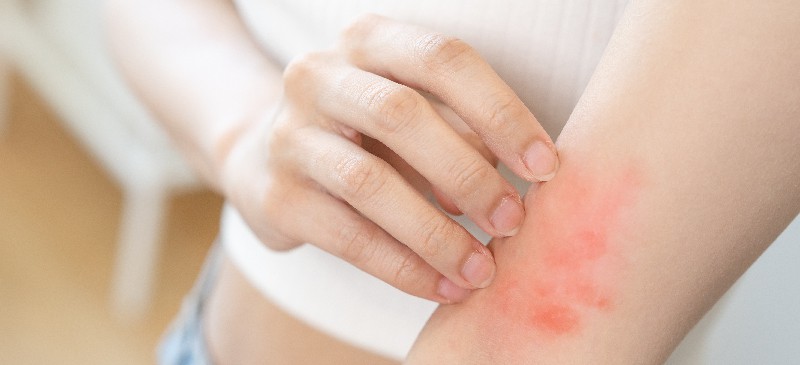Eczema and psoriasis are chronic skin conditions that can cause discomfort, irritation, and affect the quality of life for those who experience them. While they share similarities in terms of causing skin inflammation and discomfort, the underlying causes and treatments can differ. This blog explores the best medicines and treatment options available for eczema and psoriasis, focusing on both conventional and emerging therapies. Betnovate C Cream and Betnovate Gm Cream is an applied cream used to treat skin conditions such as dermatitis, psoriasis, eczema, and allergic contact dermatitis.
Understanding Eczema (Atopic Dermatitis):
Eczema, specifically atopic dermatitis, is a chronic inflammatory skin condition characterized by dry, itchy skin and recurring flare-ups. It often starts in childhood but can affect individuals of all ages. The exact cause is not fully understood but involves a combination of genetic predisposition, immune system dysregulation, and environmental factors. Common triggers include irritants, allergens, stress, and weather changes.
Symptoms of Eczema:
- Dry, sensitive skin
- Severe itching, which can worsen at night
- Red or brownish-gray patches
- Thickened, cracked, or scaly skin
- Small, raised bumps that may leak fluid when scratched
Treatment Options for Eczema:
-
Topical Treatments:
- Corticosteroids: These anti-inflammatory medications reduce itching and inflammation during flare-ups. They are available in various strengths and formulations (ointments, creams, lotions).
- Topical Calcineurin Inhibitors (TCIs): Tacrolimus (Protopic) and pimecrolimus (Elidel) are non-steroidal creams that suppress immune system activity and reduce inflammation.
- Emollients: Moisturizers help hydrate the skin, strengthen the skin barrier, and reduce dryness and itching.
-
Systemic Treatments:
- Oral Antihistamines: Help reduce itching and improve sleep quality, especially during nighttime itching.
- Oral Corticosteroids: Prescribed for severe flare-ups not controlled by topical treatments, but long-term use is limited due to side effects.
- Biologic Therapies: Target specific immune system pathways involved in eczema. Examples include dupilumab (Dupixent), which inhibits interleukin-4 and interleukin-13 signaling.
-
Phototherapy (Light Therapy):
- Controlled exposure to ultraviolet (UV) light can help reduce inflammation and itching in eczema. It’s typically used when other treatments haven’t been effective or are impractical.
-
Lifestyle and Home Remedies:
- Identifying and Avoiding Triggers: Allergens, irritants (like wool or synthetic fibers), stress, and weather changes can trigger flare-ups.
- Regular Moisturizing: Use fragrance-free moisturizers regularly to keep the skin hydrated and prevent dryness.
- Cool Compresses: Apply cool, wet compresses to soothe itchy skin and reduce inflammation during flare-ups.
Understanding Psoriasis:
Psoriasis is a chronic autoimmune condition characterized by the rapid turnover of skin cells, resulting in the formation of thick, red patches covered with silvery scales. It affects the skin, nails, and joints and can cause significant discomfort and psychological distress. The exact cause of psoriasis is not fully understood but involves genetic predisposition and immune system dysfunction, triggering an inflammatory response.
Symptoms of Psoriasis:
- Red patches of skin covered with thick, silvery scales (plaques)
- Dry, cracked skin that may bleed
- Itching, burning, or soreness
- Thickened or ridged nails
- Swollen and stiff joints (psoriatic arthritis, in some cases)
Treatment Options for Psoriasis:
-
Topical Treatments:
- Corticosteroids: Reduce inflammation and itching, and slow down skin cell turnover.
- Vitamin D Analogues: Calcipotriene (Dovonex) and calcitriol (Vectical) are synthetic forms of vitamin D that slow down skin cell growth.
- Topical Retinoids: Derived from vitamin A, these medications reduce inflammation and normalize skin cell turnover.
-
Systemic Treatments:
- Biologic Therapies: Target specific immune system pathways involved in psoriasis. Examples include TNF-alpha inhibitors (e.g., adalimumab, etanercept), interleukin inhibitors (e.g., ustekinumab, secukinumab), and IL-17 inhibitors (e.g., ixekizumab, brodalumab).
- Oral Retinoids: Used for severe cases of psoriasis not responsive to other treatments. They are derived from vitamin A and work by slowing down skin cell turnover.
-
Phototherapy (Light Therapy):
- UVB Phototherapy: Controlled exposure to UVB light slows down skin cell turnover and reduces inflammation.
- PUVA Therapy: Combines UVA light exposure with a photosensitizing medication (psoralen) to slow down skin cell turnover.
-
Lifestyle and Home Remedies:
- Moisturizing: Keep skin hydrated with fragrance-free moisturizers to reduce dryness and scaling.
- Avoiding Triggers: Stress, infections, skin injuries, and certain medications can trigger psoriasis flare-ups.
- Sun Protection: While some sunlight can be beneficial, excessive sun exposure can trigger flare-ups. Use sunscreen and protective clothing.
Challenges and Considerations:
- Individual Response: The effectiveness of treatments can vary depending on the severity and type of eczema or psoriasis.
- Side Effects: Some medications, especially systemic treatments and biologics, can have potential side effects. Regular monitoring by healthcare providers is essential.
- Long-Term Management: Both eczema and psoriasis are chronic conditions requiring ongoing management to control symptoms and prevent flare-ups.
- Patient Education: Understanding triggers, adherence to treatment plans, and regular follow-up with healthcare providers are crucial for managing both conditions effectively.
Conclusion:
Managing eczema and psoriasis involves a tailored approach that considers the type and severity of the condition, individual patient factors, and treatment goals. While there is no one-size-fits-all approach, effective treatment often combines topical therapies, systemic medications, lifestyle modifications, and ongoing patient education. Advances in biologic therapies and targeted treatments offer new hope for individuals with severe or treatment-resistant eczema and psoriasis. Consultation with a dermatologist or healthcare provider is recommended to develop a personalized treatment plan that addresses your specific symptoms and needs. With proper management, individuals can achieve better symptom control, improved skin health, and enhanced quality of life despite living with chronic skin conditions like eczema and psoriasis.

